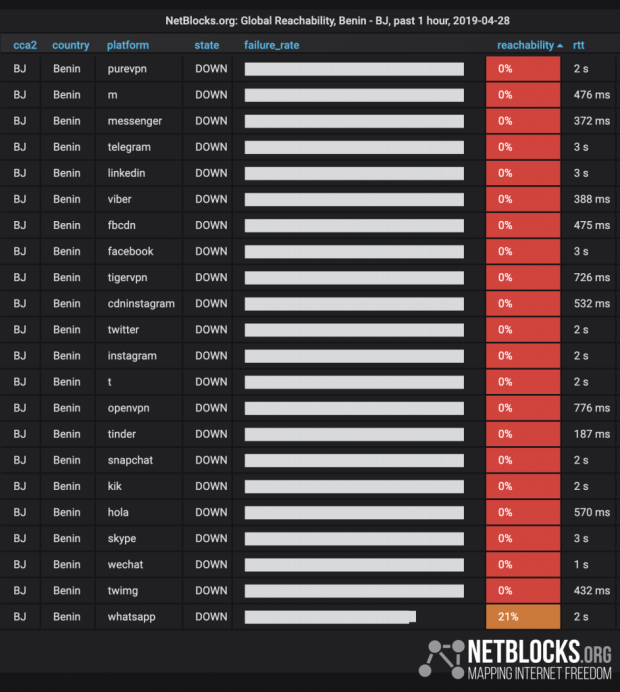The trend of internet shutdown in Africa is continuing as the government of Benin Republic has blocked internet access in the country as voting and counting of parliamentary elections takes place. The highly flawed election blocked opposition parties from even fielding any candidates for parliament.
At first, internet services including Facebook, Whatsapp and Twitter were blocked on Sunday morning. VPN services which could help users escape such restrictions were also made unavailable on Sunday.


The government then followed it up by fully shutting down the country’s biggest internet provider, Spacetel.
However, Benin is not the first African country to shut down the internet in this manner. Since 2007, several African nations have shut down the internet in their domains arbitrarily. From Chad, to Egypt, Burundi, Cameroon, Zimbabwe and even Congo, internet shutdown on the continent is very rampant and the results have been terrible for entire the country.
With the internet now an integral part of the lives of billions of people, it is undoubted that blocking internet access in a country would have negative effects on the people.
With the internet, people now pay bills, send money, receive money, follow news, make online revenue from activities like social media ads, ads on news and even online gambling.
According to a report by Deloitte, internet shutdowns cost nations an estimated 1.9% of their daily GDP. Another report by Brookings Institute estimates that internet shutdowns had a global cost of $2.4 billion between 2015 and 2016.
For instance, the Ethiopian internet shutdown in 2015 may have cost the country $500,000 per day. Meanwhile the internet shutdown in the Republic of Congo in 2015 was also estimated to have cost that country $72 million.
The government in #Ethiopia has shutdown internet connection outside of Addis Ababa since December 2017 to hide its crime. #FreeTheInternet
— Atnaf Brhane 🇪🇹 (@AtnafB) January 21, 2018
But beyond the financial costs, internet shut down also affects people’s perception about internet services. To many people, the ease with which governments can block the internet means it’s always better to run businesses offline than online. This is particularly true for countries where government control of the internet is strong.
This has even affected the growth of startups in such ecosystems, and it’s no wonder why startups don’t grow there. For instance, despite the growth of startups across Africa, Francophone Africa is still lagging behind in developing its own startups.
Unsurprisingly, in many of these countries government is usually dictatorial and its control over the internet is strong.
Until African leaders realise that the internet is a tool for technological and economic advancement and not a weapon for political subjugation, Africa and Africans will continue paying the steep price for their misplaced priority.






